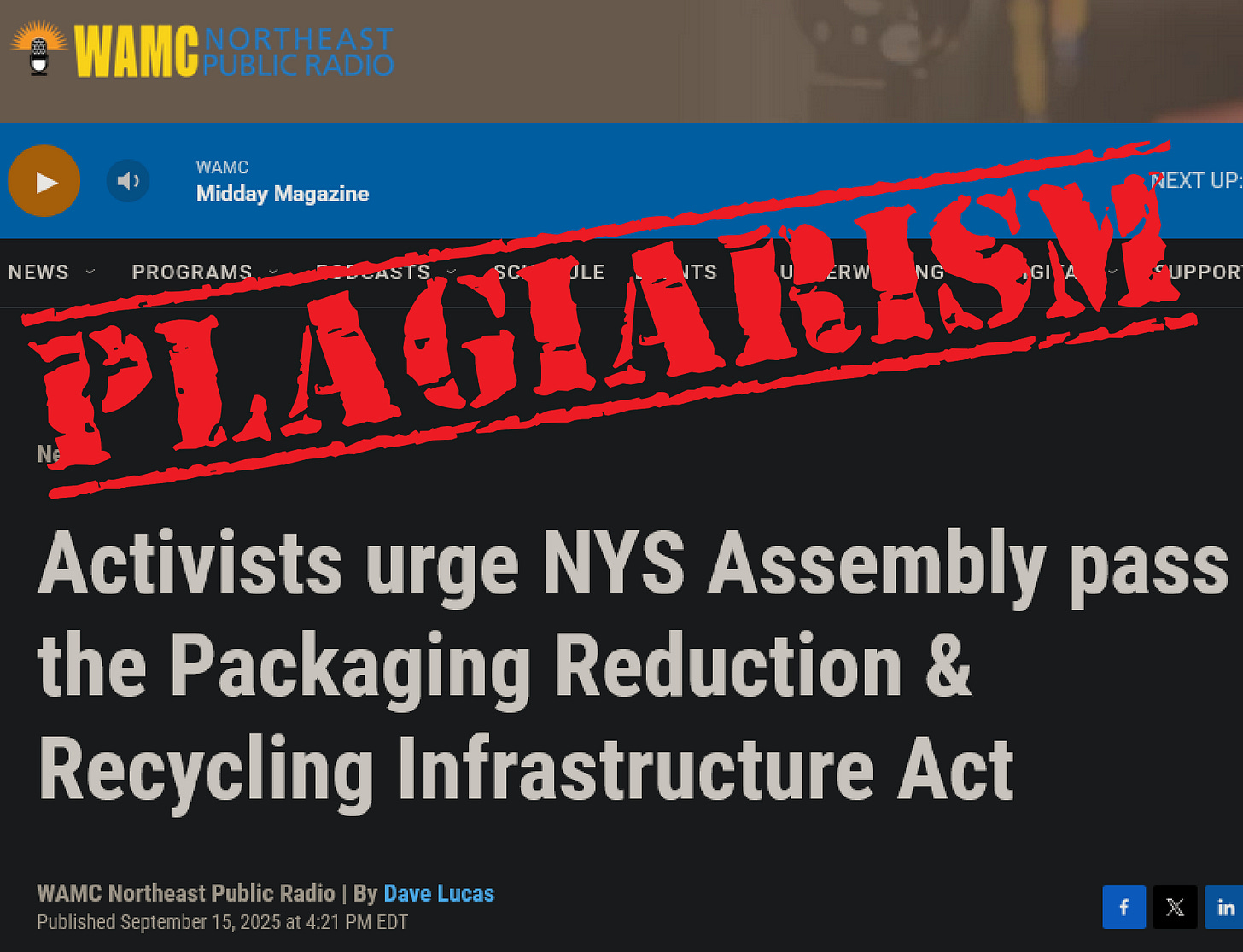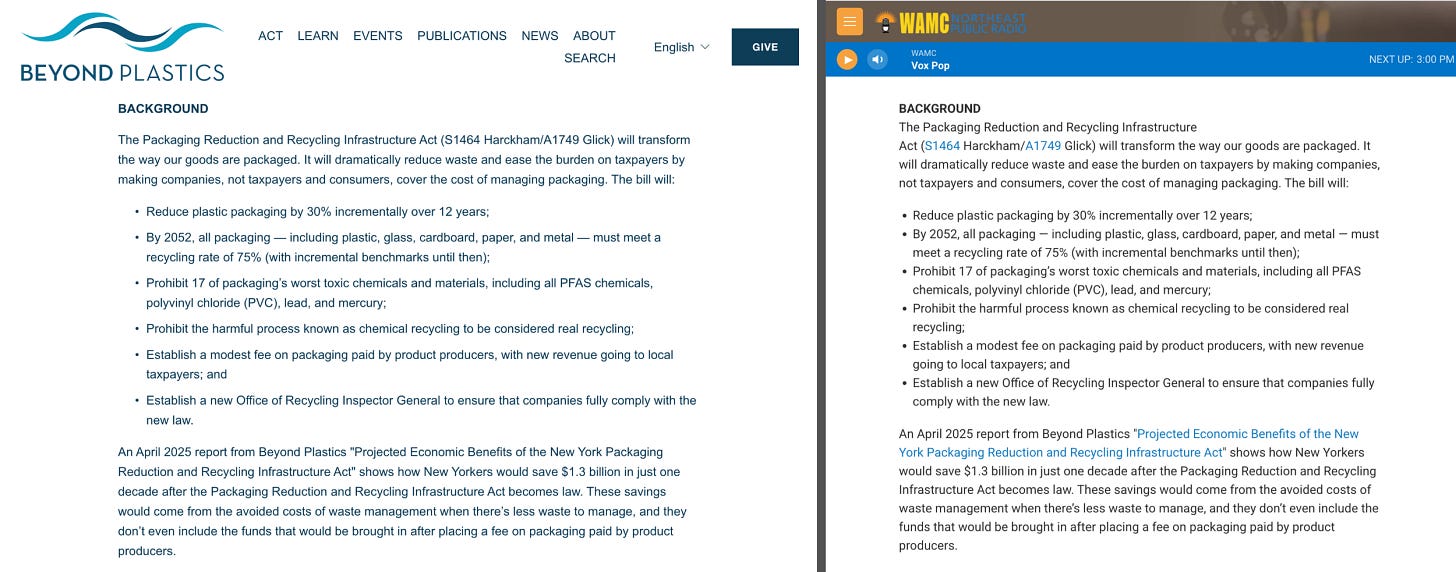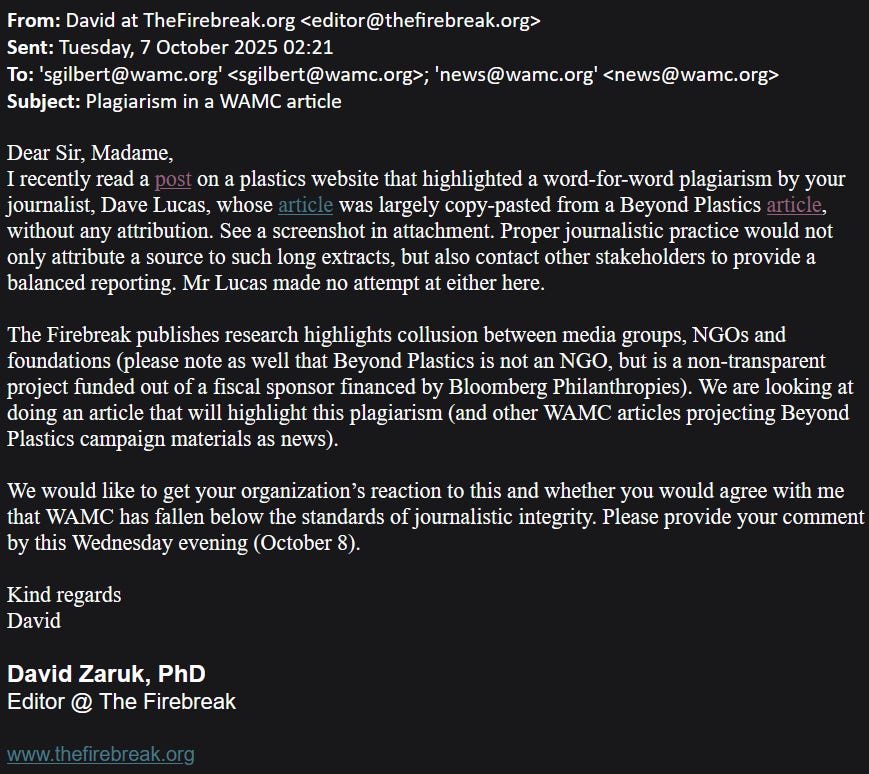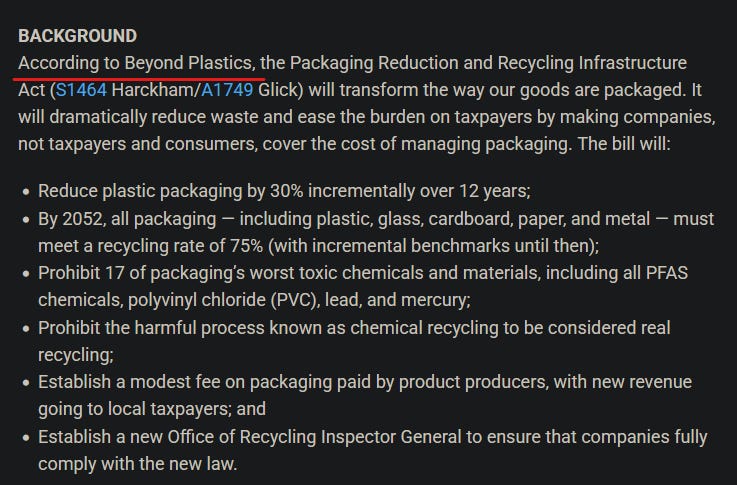Collusion: WAMC Plagiarism Scandal Exposes Media Bias and Ethical Decay
Reporters shouldn't copy and paste NGO press releases.
For decades, reporters from major news outlets have plagiarized content and gotten away with it—nearly half the time, no penalty is meted out. “Punishment is uneven, ranging from severe to virtually nothing even for major offenses,” the Columbia Journalism Review noted in 1995. Almost 20 years later, in 2014, media watchdogs continued to document high-profile cases of plagiarism in the news trade.
As the journalism industry continues to implode—with media outlets increasingly dependent on their subjects for financial support—these ethical breaches have only become more blatant. The Firebreak recently spotted a particularly scandalous example of this behavior at an NPR affiliate in New York, where a reporter copied entire paragraphs of his story on a piece of environmental legislation from an activist outfit lobbying for the same bill.
The incident reveals not only a breach of journalistic ethics but also a troubling pattern of collusion between media outlets and advocacy groups with shared ideological goals, a phenomenon that is rapidly distorting the public discourse and causing demonstrable harm to productive industries and their customers—that is, all of us.
WAMC Plagiarism Scandal: A Breach of Trust
At the heart of the controversy is WAMC’s unattributed use of text from Beyond Plastics, an “NGO” with a habit of skirting nonprofit financial rules by laundering its donations through a tiny Vermont college. On September 15, WAMC Capital Region Bureau Chief David Lucas published a story titled Activists urge NYS Assembly pass the Packaging Reduction & Recycling Infrastructure Act. The short piece consists almost entirely of a single quote from a Beyond Plastics representative and a summary of the bill—plagiarized entirely from a Beyond Plastics press release.
A Beyond Plastics’ press release set against WAMC’s coverage of the New York bill. The text in both documents is identical. Source.
As a piece of media criticism, this is typically the part of the story where we chastise WAMC for violating its own code of ethics—”Sources of information should be disclosed. Individual sources should be named”—and urge the station to do better, especially since it has received generous support from taxpayers over the years. But there’s much more to this scandal than a one-time ethical breach driven by journalistic sloppiness: namely, a cynical willingness to flout the rules in pursuit of the ideological goal of eliminating plastics.
Bias at WAMC
Consider a few details related to this case. First, Lucas has a long history of writing slanted environmental stories. His coverage of regional policy debates about oil pipelines, wildfires, “green” energy and agriculture —without any exception we could find—favors the advocacy of groups like Beyond Plastics. These articles don’t even hint at the possibly that there’s another side to the story: that solar panels have their own environmental downsides, that climate change may not be the primary driver of recent wildfires, or that pipelines are one of the safest and most sustainable ways to transport energy. Lucas’ readers almost certainly don’t understand these nuances because he doesn’t bother reporting them. This is not the track record of an unbiased journalist.
Second, WAMC regularly offers Beyond Plastics president Judith Enck a platform to spread her message. Enck has appeared on the station’s The Roundtable podcast at a rate of just over once a month in 2025, and she’s been a guest on the show dozens more times going back to 2020. No representative of any industry that Enck routinely attacks has been extended so generous an opportunity to share their opinions.
Together with Lucas’ documented plagiarism, WAMC’s ongoing relationship with Beyond Plastics and slanted coverage suggest the station is comfortable serving as a mouthpiece for particular ideological causes, even if it erases the line between journalism and advocacy.
After The Firebreak learned of Lucas’ plagiarism, we contacted WAMC to inquire if the station was aware of his ethics breach and Beyond Plastics’ innovative accounting methods—especially since a significant chunk of its funding comes from a politically connected billionaire who backs multiple anti-plastic groups. These obvious conflicts of interest would trigger warning sirens for the leadership of any serious newsroom, yet we received no reply from WAMC’s news staff nor its CEO Sarah Gilbert.
A few days after we contacted the station, WAMC’s piece was quietly updated to reflect the fact that Lucas had sourced most of his article from Beyond Plastics, though there was still no acknowledgment of his plagiarism. There weren’t even quotation marks around the Beyond Plastics text, communicating to readers that they were Lucas’ words when they were not.
WAMC does not disclose the identities of its donors, so we can’t know if the station has a financial incentive to overlook the impropriety of its reporters and the activists it amplifies. But NPR, WAMC’s parent organization, has received many millions of dollars from foundations that finance anti-industry advocacy, and amplified those same campaigns without disclosing its financial conflicts. We can’t help but wonder if a similar dynamic is at work in this NPR affiliate. WAMC’s non-response to our inquiry only heightened our curiosity.
The Bigger Picture: Unhealthy Collusion Between Media and Advocacy Groups
The WAMC scandal is not an isolated incident but a symptom of a broader problem in modern journalism: the growing collusion between media outlets, advocacy groups and wealthy donors that finance the undisclosed cooperation. As we have reported multiple times over the last two years, Beyond Plastics is just one of many organizations that benefit from cozy relationships with sympathetic journalists. These groups provide pre-packaged narratives, data, and talking points, which resource-strapped newsrooms uncritically adopt. In return, advocacy groups gain a powerful platform to amplify their message, cloaked in the legitimacy of “objective” reporting.
This dynamic creates a feedback loop where media outlets and advocacy groups reinforce the same agendas, sidelining dissenting voices and distorting public discourse. In the case of WAMC and Beyond Plastics, the shared goal appears to be the demonization of plastics, regardless of the economic or practical consequences—which can run into the billions for businesses and consumers.
Restoring Trust: A Call for Accountability
To restore public trust, WAMC and other media outlets must take concrete steps to address these ethical failures. First, the radio station should issue a public apology for the plagiarism and commit to stricter editorial standards to prevent future violations. This includes mandatory training on proper attribution and a review of sourcing practices to ensure transparency.
Second, media outlets must radically reform their relationships with advocacy groups. While it’s acceptable to use such organizations as sources, it’s indefensible to use them as sources and cover them as subjects, while taking money from the same donors they do. Ask Beyond Plastics what it thinks of a proposed plastic regulation, but verify its claims and seek out opposing viewpoints. We’re always ready and willing to provide quotes.
There’s only one other alternative. Media outlets keep taking money from and shilling for ideological billionaires. The public, increasingly aware that journalists are merely hired guns, continues to lose trust in legacy news outlets and finally abandons them for independent sources that will give them the facts. Either option is fine by us.






